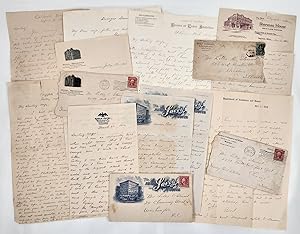Descripción
Illinois native Ethelbert Stewart (1857-1936) was a longtime employee of the United States Labor Department and a pioneer in the field of labor statistics. Originally a coffin-maker by trade, he developed an interest in labor issues in the 1880s, secured an appointment as Secretary of the Illinois Board of Labor, and became active in the Knights of Labor. He held positions several other government agencies, including the Federal Bureau of Labor, the United States Children's Bureau, and the Tariff Board, before becoming Deputy Commissioner of the Department of Labor in 1913. In 1921, he became Commissioner of Labor Statistics. He is recognized for having greatly expanded the types of statistics that gathered and reported on wages, prices, the cost-of-living, industrial safety, pension and retirement income, and labor productivity. This archive consists of 26 handwritten letters from Stewart to his wife, Lettie (22 letters) and daughter, Zelda (4 letters), a few undated, the remainder spanning the period 1887-1919. Written from various places that Stewart traveled for work, most of the letters are multiple pages, several are accompanied by original mailing envelopes, and some are on official (Illinois Bureau of Labor Statistics; Department of Commerce and Labor) or hotel letterheads. Condition is very good, with some expected handling wear. The content of the letters is mostly personal, but occasional comments on labor issues do appear. For example, on July 19, 1907, he writes from Oakland, California: "I have just got a settlement. The strike was called off an hour ago, and the town is wild." In March, 1910, from Bethlehem, Pennsylvania: "I have been through one of the largest plants in the world and am almost tired to death.I wish to heaven I could get out of this everlasting jar and jangle of strikes, conflicts, and lying. Away from strife and the thoughts of strife, and of force, force, force as the only solution to any problem. This immense plant makes everything but men, and there is little manhood on either side of the conflict." And on October 1, 1913, from Denver: "Went out through some of the coal camps now on strike in an automobile.I do not know how much of the stuff printed here is being telegraphed to the outside, but you need not be alarmed about the reports of my automobile being 'held up by armed guards' and all that rot. We were stopped by the 'gun-men' but as soon as they learned who we were they let us go on. The operators here are hell-bent for militia to act as strike-breakers and I am afraid Governor Ammons is too weak.to withstand them long." Some of the personal content is relatively mundane (finances, living arrangements, health, friends, etc.) but much is quite interesting -- reflecting the musings of an educated and thoughtful man on the places he visited ("the fact of being a government agent makes it possible for me to see more than any other man on earth could see without that advantage") and on a variety of contemporary social and cultural issues. In March 1889, he tells his wife he wishes she could have heard Susan B. Anthony speak: "She has the same charges to make against the government, the courts, and the laws, on the woman questions, precisely the same, as the anarchists have on industrial questions. If you take out the word 'woman' and insert the word 'labor' in its place in her speeches you have a tip-top, first-class lake front anarchist speech. She is a dandy, and hit's 'em hard." In September 1898 he writes his daughter Zelda on the subject of human evolution, explaining his understanding of Darwin's theories and concluding that "In short, Scientific Evolution, as a theory, is not inconsistent with intelligent Theosophy, which claims that each psychic center must travel through the whole realm of experiences from worm to man, from man to God, for ever and ever more complex and more intelligent, upward and onward through all forms of life, through all experiences. It is only the material. N° de ref. del artículo 22689
Contactar al vendedor
Denunciar este artículo
![]()
